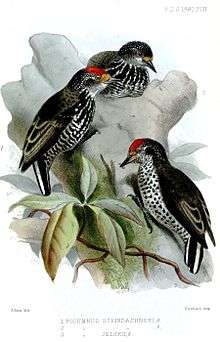Ocellated piculet
The ocellated piculet (Picumnus dorbignyanus) is a species of bird in the family Picidae. It is found in Argentina, Bolivia, and Peru. Its natural habitats are subtropical or tropical moist montane forests and heavily degraded former forest. It was first described in 1845 as Picumnus d’Orbignyanus by the French ornithologist Frédéric de Lafresnaye, being named in honour of the French naturalist Alcide d'Orbigny, but since then has been largely mis-spelt as P. dorbygnianus.[2] It hybridizes with the white-barred piculet where their ranges overlap.[3]
| Ocellated piculet | |
|---|---|
 | |
| Male and female speckle-chested piculet (above), male ocellated piculet below | |
| Scientific classification | |
| Kingdom: | Animalia |
| Phylum: | Chordata |
| Class: | Aves |
| Order: | Piciformes |
| Family: | Picidae |
| Genus: | Picumnus |
| Species: | P. dorbignyanus |
| Binomial name | |
| Picumnus dorbignyanus Lafresnaye, 1845 | |
| Synonyms | |
|
Picumnus d’Orbignyanus | |
Description
The adult ocellated piculet is 9 to 10 cm (3.5 to 3.9 in) long. The sexes are similar apart from the forecrown which is streaked with red in the male but not in the female. The hind crown and the upper parts of the body are greyish-brown, some feathers having a blackish central section and pale tips, giving a speckled effect. The wings are brown, the large feathers being tipped and edged with buff. The tail is brown or black, with two white central feathers and pale patches on the outer feathers. The underparts are whitish, the throat being scaled with dark colour and the breast feathers having a central dark section, giving a chevron effect. The belly is buff, either plain or slightly barred. The iris of the eye is black or brown, the beak is blackish and the legs and feet are grey. There is a grey orbital ring around the eye. Juveniles resemble females but are rather darker, with fine barring on the mantle and underparts.[4]
Distribution and habitat
The ocellated piculet is native to South America. It is found in the foothills on the eastern side of the Andes, its range extending from Peru and Bolivia to northern Argentina, at altitudes between 900 and 2,500 m (3,000 and 8,200 ft). Its habitat is primary rainforest and secondary moist forest, where it frequents bushy undergrowth, with vines, creepers and epiphytes. It is not migratory, but may move to slightly lower elevations in winter.[4]
Ecology
The ocellated piculet often feeds in small flocks of mixed species, foraging for small insects and other invertebrates.[4] Little is known of its breeding habits.[2]
Status
The ocellated piculet has a very wide range and is described as a fairly common bird. The population appears to be stable, and the International Union for Conservation of Nature has assessed its conservation status as being of least concern.[1]
References
- BirdLife International (2016). "Picumnus dorbignyanus". IUCN Red List of Threatened Species. 2016: e.T22680742A92875722. doi:10.2305/IUCN.UK.2016-3.RLTS.T22680742A92875722.en.
- Winkler, H.; Christie, D.A.; Kirwan, G.M. "Ocellated Piculet (Picumnus dorbignyanus)". Handbook of the Birds of the World Alive. Lynx Edicions, Barcelona. Retrieved 22 April 2017.
- McCarthy, Eugene M. (2006). Handbook of Avian Hybrids of the World. Oxford University Press, USA. p. 108. ISBN 978-0-19-518323-8.
- Gorman, Gerard (2014). Woodpeckers of the World: A Photographic Guide. Firefly Books. pp. 68–69. ISBN 177085309X.
